Singapore’s Sustainability: Our Garden City’s Green Efforts
Singapore is known as a ‘Garden City’. Beyond this reputation, Jamie Mah looks into what Singapore is aiming to do to be more sustainable as a country and how the youths of our little red dot are contributing.
As part of the Green Plan 2030, Singapore plans to plant a million more trees. Photo taken from Tomorrow City.
BY
Jamie Mah
Editor
Hype Issue #53
Published on
June 24, 2021
With a population of nearly 8 billion people on this planet, global warming has become an extremely severe problem, and it is only growing worse with each passing year. More people are emerging as climate activists and urging others to be more environmentally-friendly, in an effort to curb the already disastrous effects of climate change.
Some of the biggest culprits of pollution are plastic, chemical and electronic waste, which have resulted in air and ocean pollution.
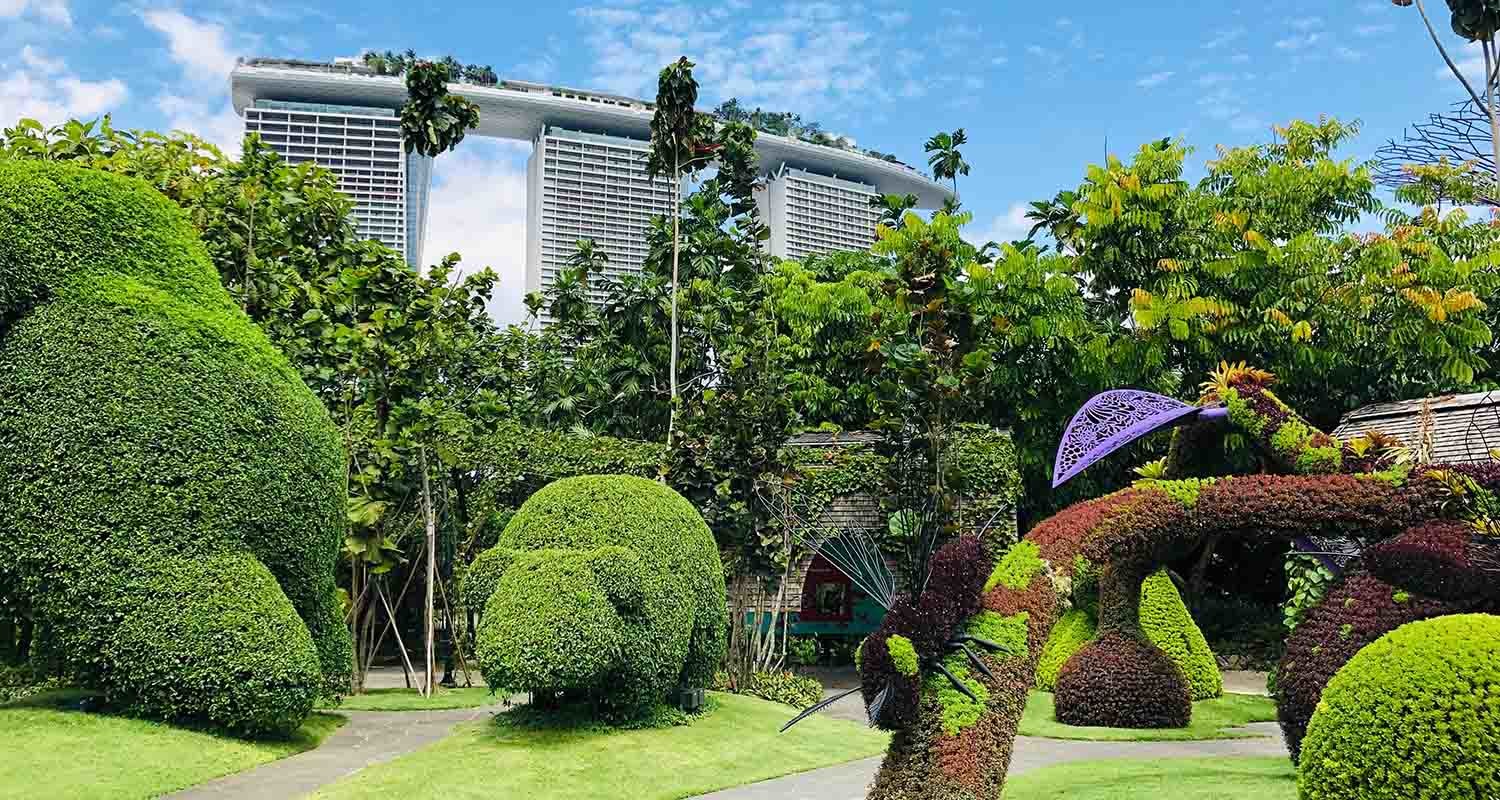
As part of the Green Plan 2030, Singapore plans to plant a million more trees. Photo taken from Tomorrow City.
With a total population of around 7.6 billion people, mankind currently produces two billion tonnes of waste per year. This number is predicted to rise by 70 per cent by 2050. According to Senseonseo, “The United States is the biggest generator of waste per capita worldwide, with each citizen producing an average of 808 kilograms per year – almost a tonne – and more than double that of citizens of Japan.”
According to The Guardian, “a million plastic bottles are bought around the world every minute and this number will jump another 20 per cent by 2021.” The International Union for Conservation of Nature (IUCN) states that “at least 8 million tons of plastic end up in our oceans every year, and make up 80 per cent of all marine debris from surface waters to deep-sea sediments.”

According to The Straits Times, producing one metal straw uses enough energy to produce more than 100 plastic straws. Photo by Jamie Mah.
According to WWF Singapore, about 900 million kilograms of plastic waste are discarded in Singapore each year, and only 4 per cent of this is recycled.
Not to mention, according to the National Environment Agency (NEA), about 5.88 million tonnes of solid waste were generated in 2020, and of this, 3.04 million tonnes were recycled. This is 19 per cent less than the 7.23 million tonnes of waste generated in 2019.

Semakau landfill is located just 8km south of Singapore. Photo taken from The Straits Times.
In Singapore, most of our waste goes to the Pulau Semakau landfill, the world’s first ever offshore man-made landfill created from sea space. This landfill was first opened in 1999 and is estimated to run out of space by 2035, a decade earlier than initially thought.
However, the amount of waste disposed has increased seven-fold over the past 40 years in Singapore. Singapore also incinerates most of its trash, and the ash from the incinerator goes to the landfill as well, further contributing to the space consumption.
Despite helping to dispose of our non-recyclable and plastic trash, incineration in itself is not a sustainable option as it produces carbon emissions which contributes to climate change and further air pollution.
Beyond initiatives by youths themselves, there are other youth organisations that promote sustainability on a nationwide scale.
Youth Catalyst only began last year, after the 2020 General Elections in Singapore
Initiatives
The word ‘sustainability’ means something different to each person. Cambridge dictionary defines ‘sustainability’ as the quality of being able to continue over a period of time.
For Ms Jess Chua, 37, the head of political party Progress Singapore Party’s (PSP) Youth Wing, otherwise known as Youth Catalyst, sustainability is about “living responsibly now, so that the next generation does not have to start deficit.”
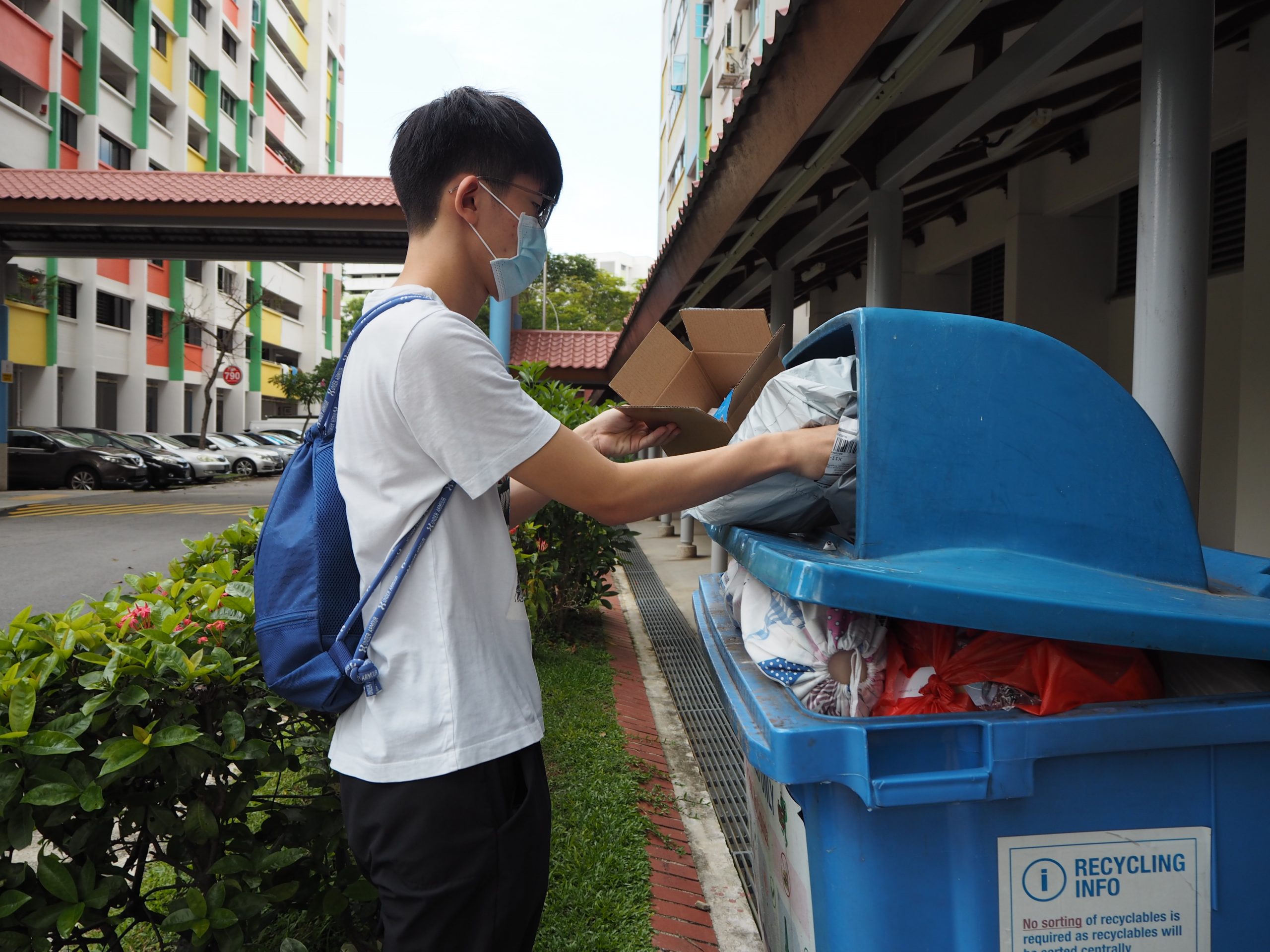
A 2019 study done by the Ministry of the Environment and Water Resources (MEWR) and the National Environment Agency (NEA) found that around 60 per cent of Singapore households recycle regularly. Photo by Jamie Mah.
“We must view sustainability beyond reducing waste and greenhouse gases,” said Ms Chua.
Youth Catalyst is among the many sustainability initiatives in Singapore. Other initiatives include the popular “Straw-free Singapore” movement that began in 2019 and Bring Your Own Bottle (BYOB), along with organisations such as Repair Kopitiam.
Repair Kopitiam
Repair Kopitiam is part of a movement from Sustainable Living Lab and aims to fight the ‘buy-and-throw-away’ culture in Singapore through repair.
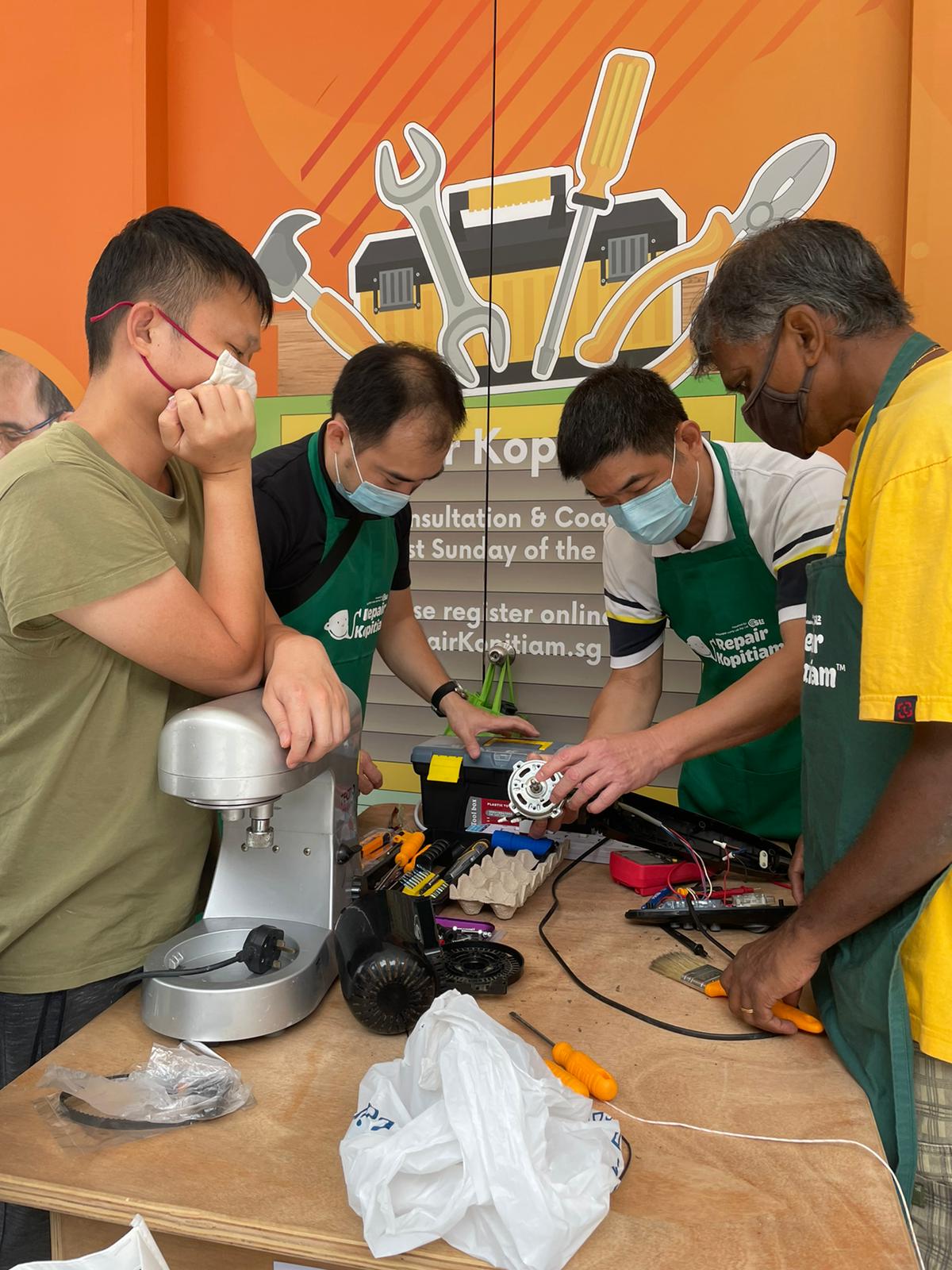
Repair Kopitiam holds monthly community sessions to encourage repair. Photo courtesy of Danny Lim.
“We are heading from a linear economy to a circular economy… [and] the truth of the matter is the items that are in circulation are not designed as circular products,” said Mr Danny Lim, 53, Community Lead at Sustainable Living Lab. “That means that this product will eventually die… [thus ending] its useful life and [being] thrown away.”
Products that are not designed for circulation are not sustainable. Repair Kopitiam then hopes to counteract this and sustain their useful life for as long as possible through repair.
The ‘buy-and-throw-away’ culture, otherwise known as ‘throwaway culture’, can be explained as an “economy strongly influenced by consumerism”, as stated by Paper Round.
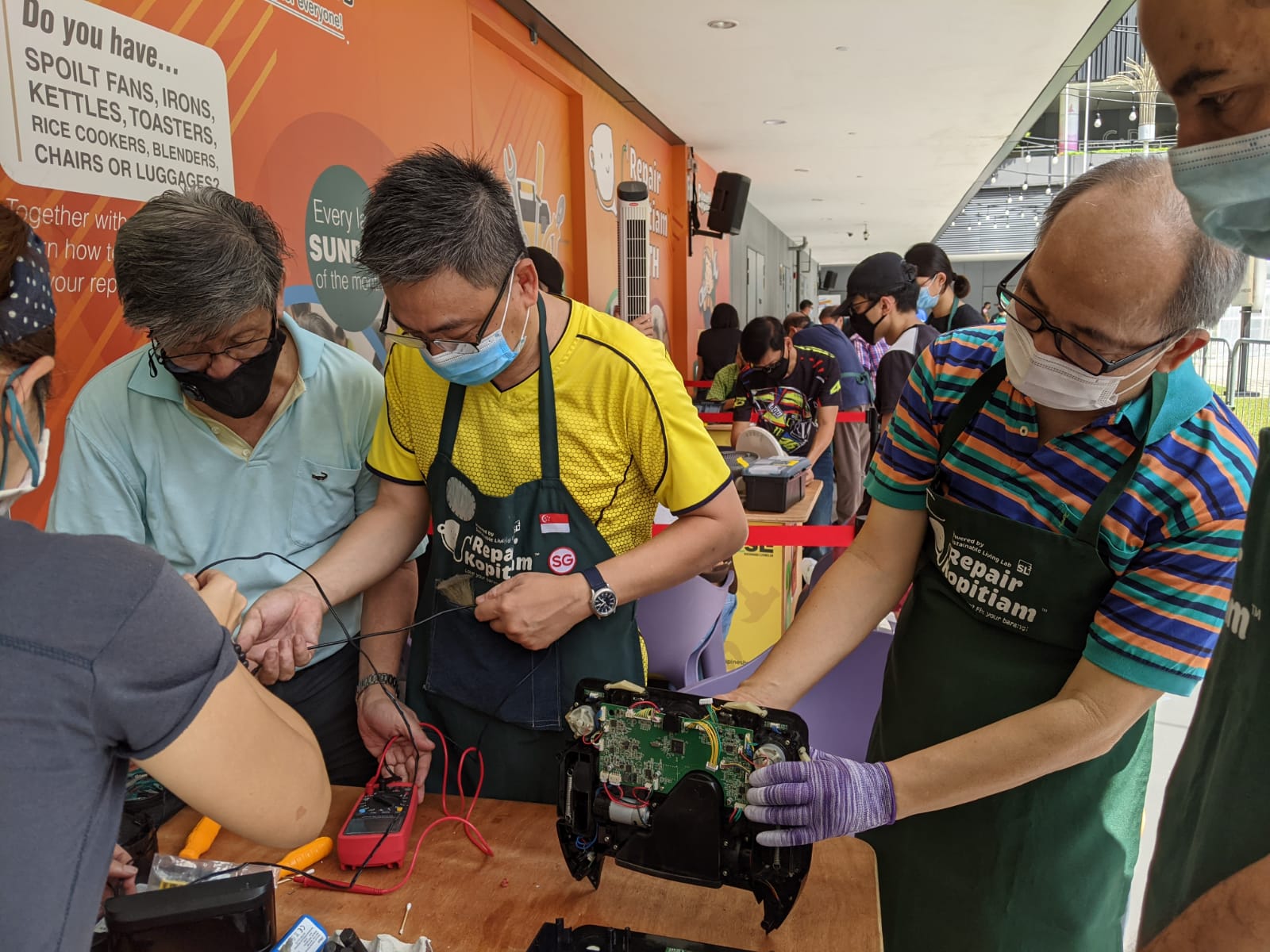
Repair Kopitiam helps to reduce irresponsible electronic waste. Photo courtesy of Danny Lim.
“Because of consumerism, we have lost the ability to repair,” said Mr Lim. “Most of the time, it’s actually more commercially viable to replace rather than repair.”
This attitude of ‘replace rather than repair’ contributes to the amount of waste produced as these products that are replaced are tossed into the bin, which ultimately ends up in our landfill.
Repair Kopitiam holds monthly community repair meetings to teach others how to repair items that they bring, and these items range from electronics to even damaged clothing. They have several locations, and you can sign up as either a participant or volunteer at any of these locations.
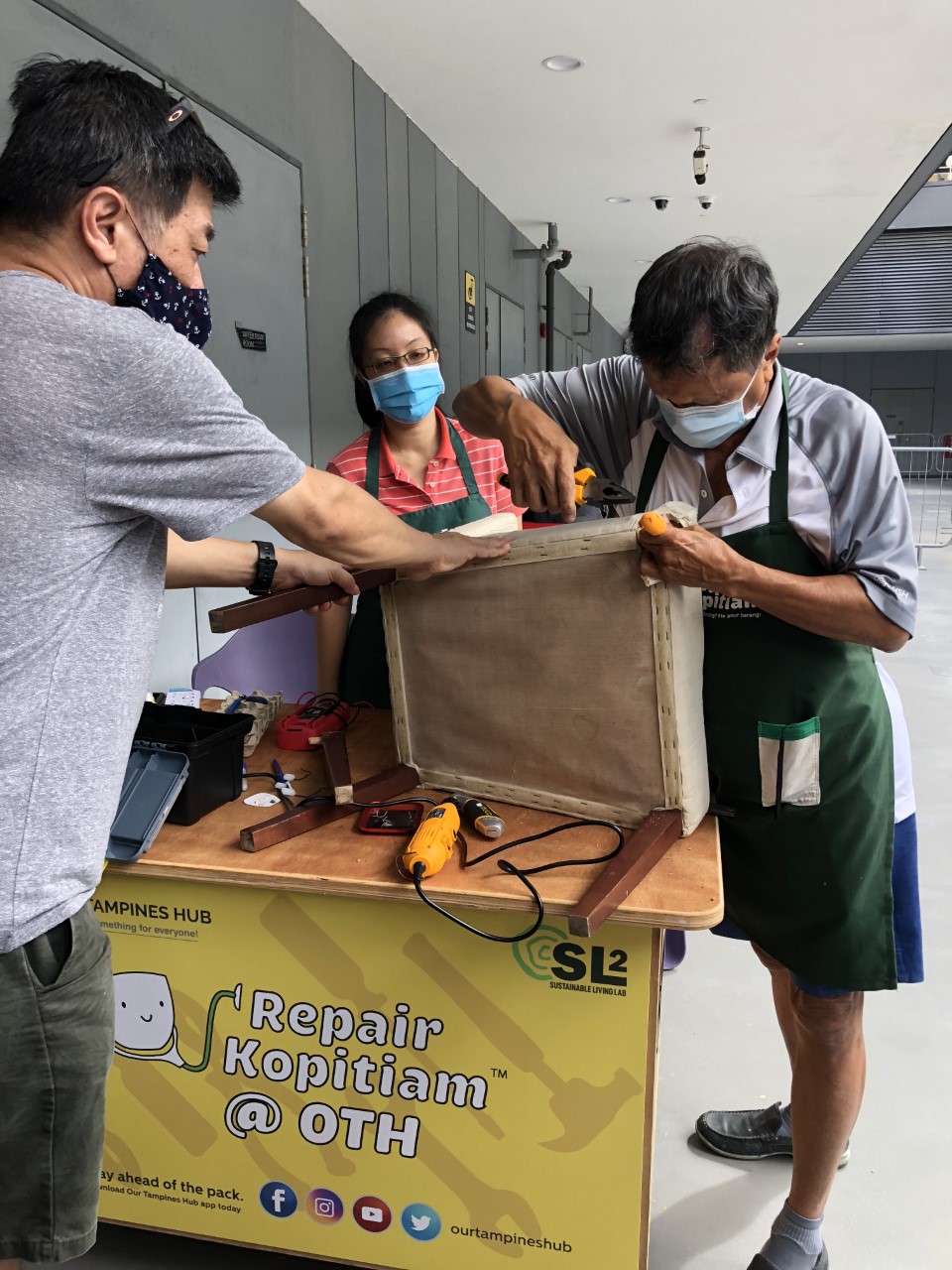
Repair Kopitiam holds community sessions at Tampines Hub, Coral Ris, Yuhua and Choa Chu Kang. Photo courtesy of Danny Lim.
Through these repair meetings, Repair Kopitiam hopes to promote the attitude of ‘repair before replacing’ and teach all members of the community the value of their items.
BYOB
Other than such community initiatives, there are also youth efforts to be sustainable, and an example would be the BYOB initiative. Founded by Kate Yeo Jen-En, 19, this initiative aims to ‘reduce the wastage of single-use plastics in Singapore’.
Kate first began gaining awareness about why she should be more environmentally-friendly in 2018 due to her friends being very passionate about sustainability, and so she made the “personal switch in [her] own life to start being more eco-conscious.”
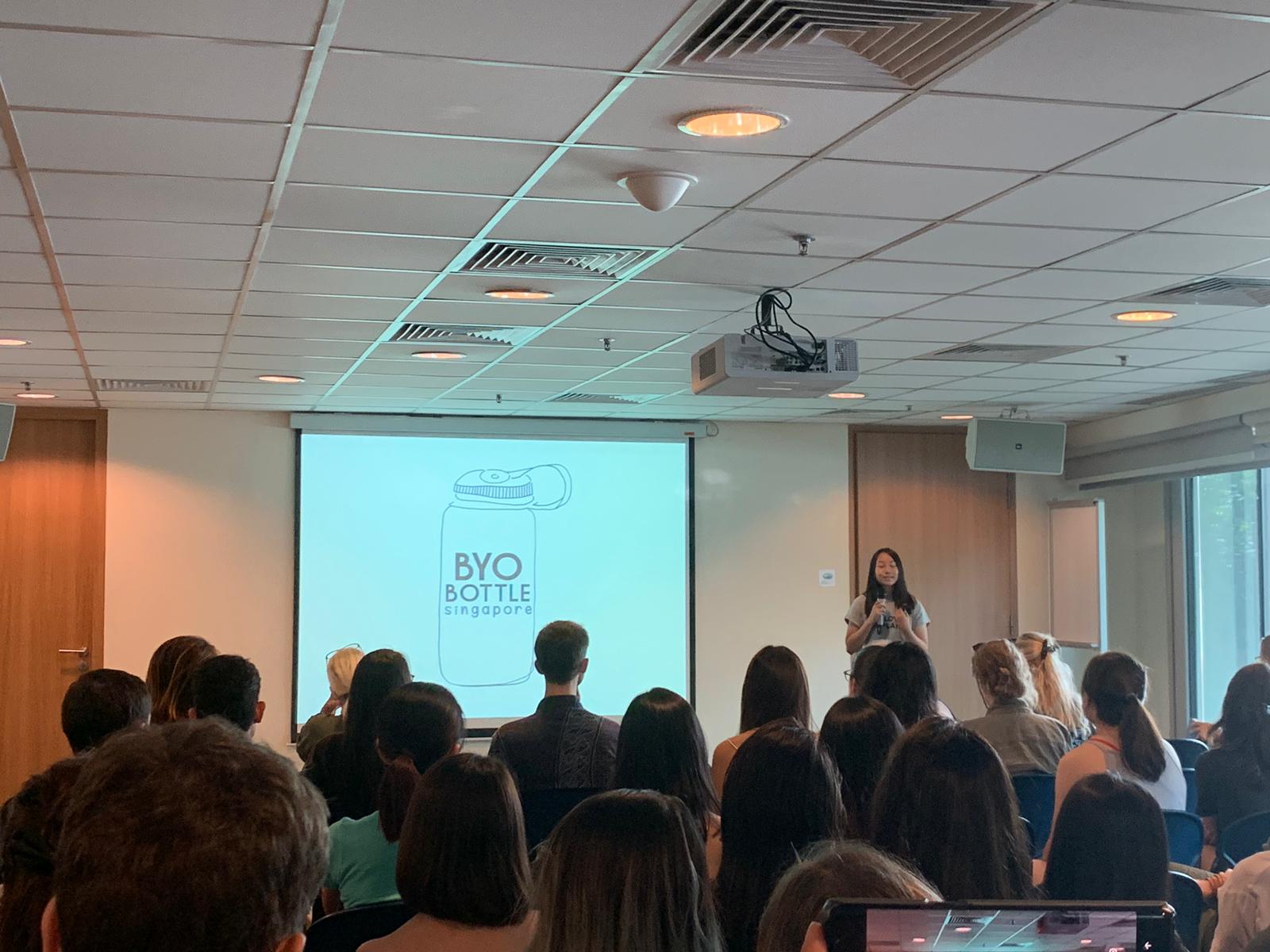
Kate hopes to educate others and promote awareness about sustainability. Photo courtesy of Kate Yeo Jen-En.
However, after making the effort to bring her own cutlery and bottle around in her daily life for several months, she noticed that people around her were still using plastic.
“I felt like maybe I should take one step further, and try [to] drive change on a larger scale, rather than letting it stop at myself,” said Kate. She was also inspired by the Straw-free Singapore initiative that made its way around Singapore in 2019.
BYOB does their part by reaching out to Food & Beverage (F&B) businesses, encouraging them to allow BYO (bring your own) for their customers in order to promote sustainability.
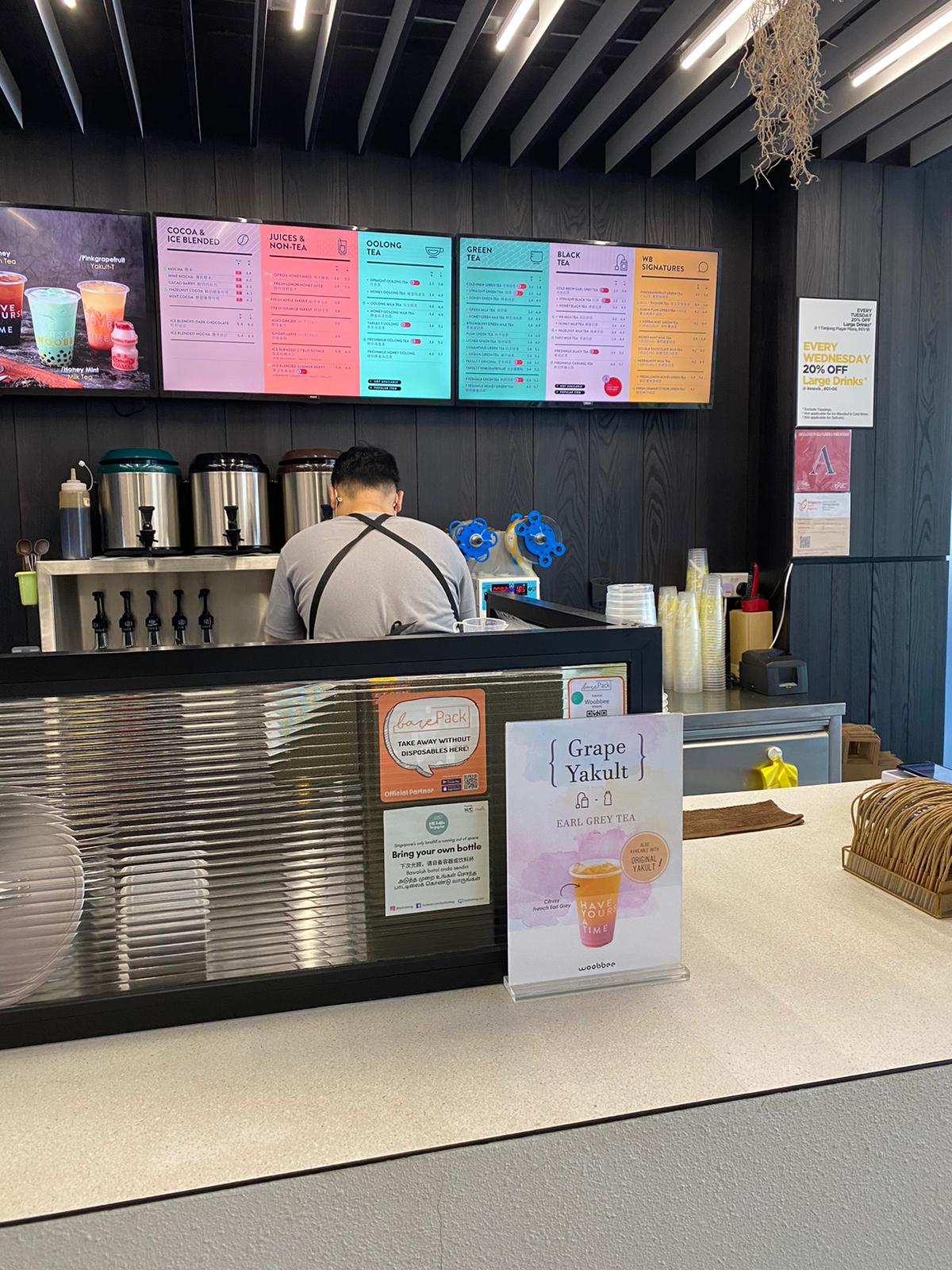
Bubble tea shops contribute to single-use plastic waste, so BYO is a sustainable option for them. Photo courtesy of Kate Yeo Jen-En.
While some businesses and drink stalls might be against this for fear of hurting their business, as many as 231 drink stalls have jumped on the bandwagon and begun offering BYO at their stalls or not offering plastic straws. BYOB also offers stalls with their own stickers in hopes of promoting awareness for the public.
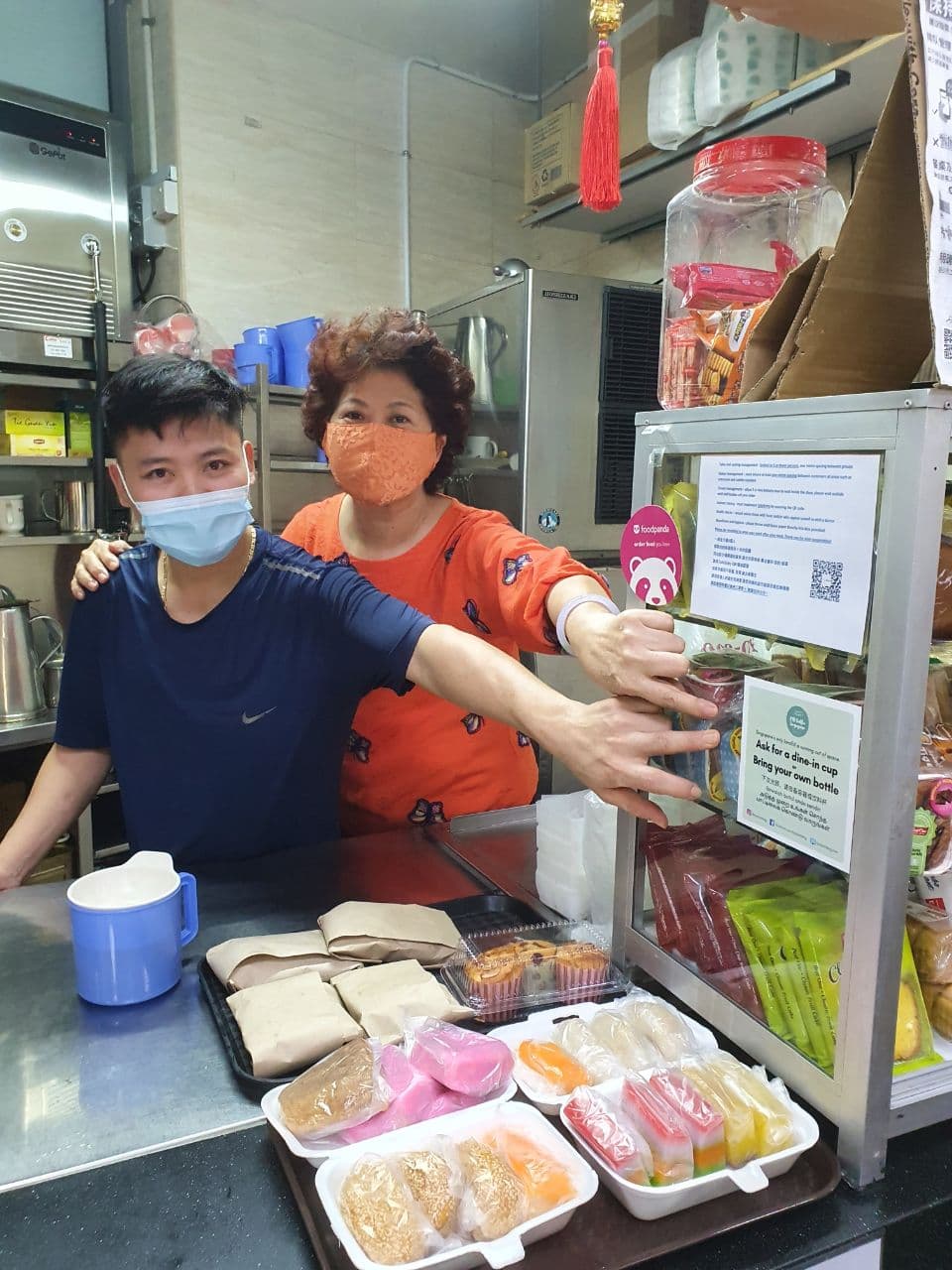
The BYO movement benefits businesses as they spend less on food packaging. Photo courtesy of Kate Yeo Jen-En.
Such youth initiatives may not have much of an impact on the actual problem of climate change, but they help to generate awareness and create conversation on the issue of climate change and ways people can be more sustainable.
“Although [these] movements don’t do very much for the true practicality of saving the Earth, … they create awareness that we have a problem,” said Mr Lim.
Youth Catalyst
Beyond initiatives by youths themselves, there are other youth organisations that promote sustainability on a nationwide scale. Youth Catalyst only began last year, after the 2020 General Elections in Singapore.
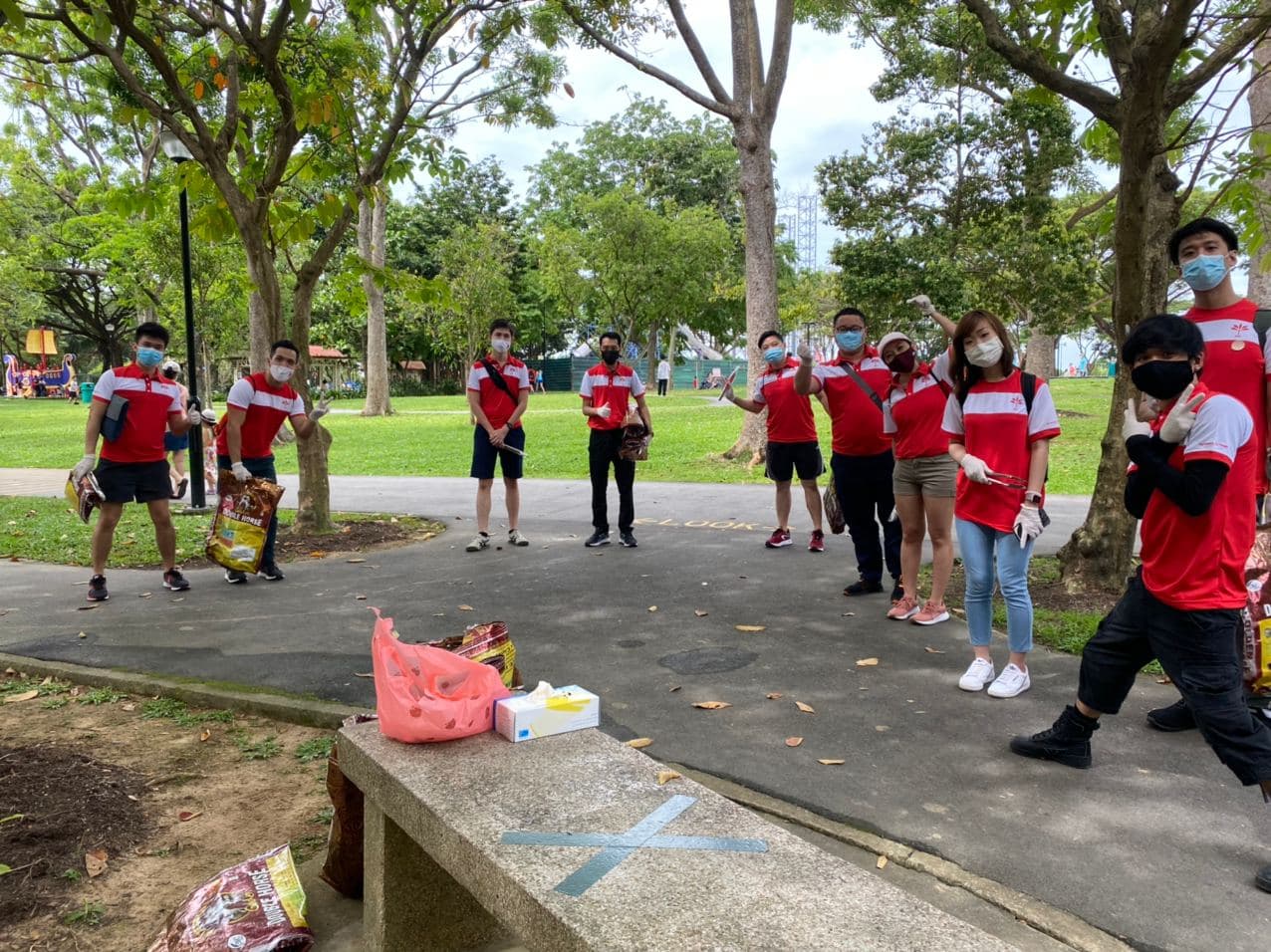
Passionate youths at a Youth Catalyst clean-up event. Photo courtesy of Youth Catalyst.
“The leaders in the party recognised the need for distinct representation of this new generation of young Singaporeans, who may have different aspirations, priorities and see things from a very different point of view,” said Ms Chua.
Their events are proposed by the youths through their brainstorming sessions, in which they share their ideas and passion for the environment. Some of their events include clean-ups at beaches and neighbourhood parks.
After each clean-up, they separate what they have gathered into recyclables and trash, and at the same time, look for what can be salvaged. As with other youth initiatives, they also focus on raising awareness.
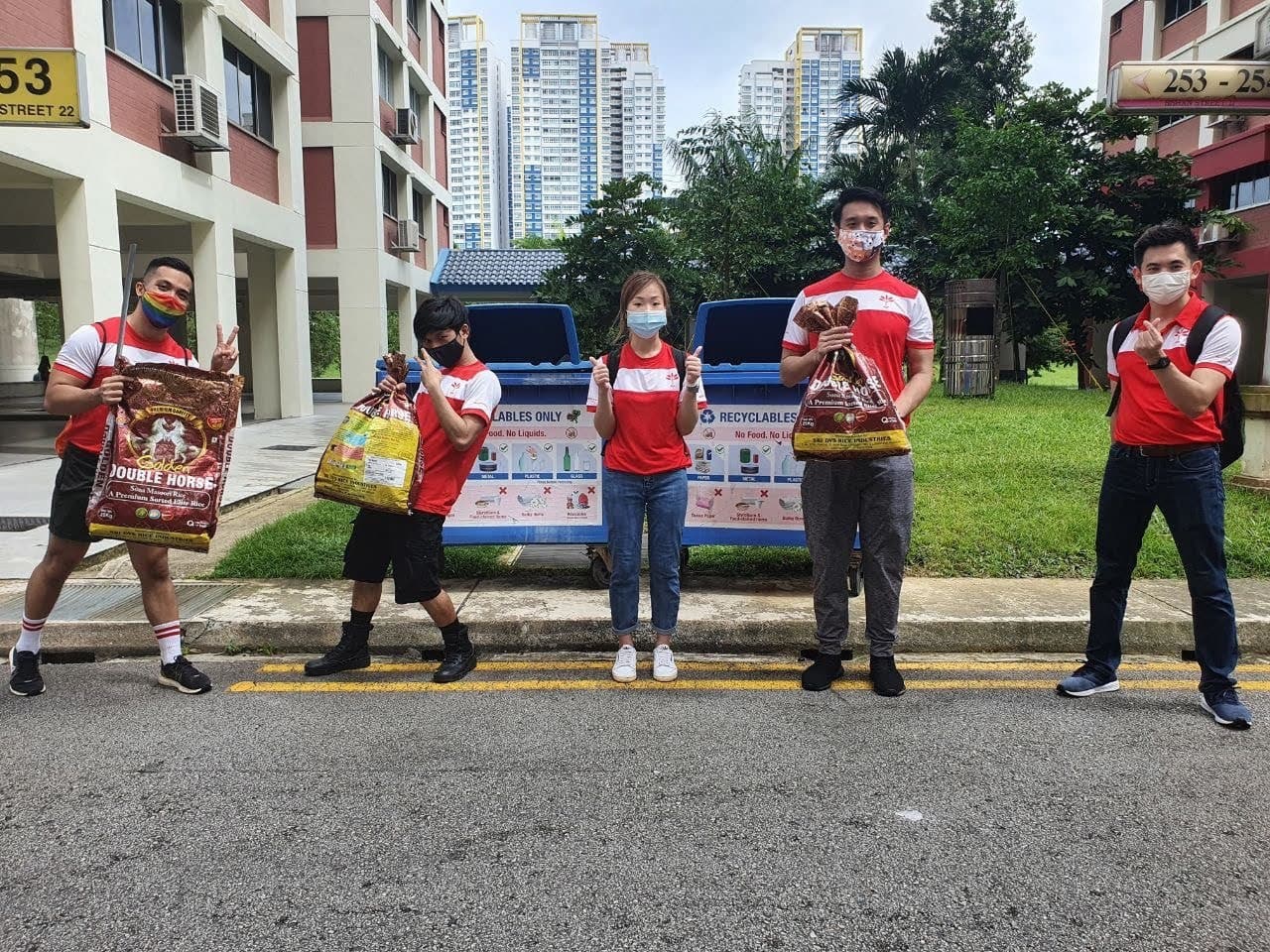
Youth Catalyst members in a socially distanced recycling effort. Photo courtesy of the Youth Catalyst.
“Youth Catalyst focuses on creating awareness about sustainability through our youth capitalist events and social media,” explains Ms Chua.
PSP decided to focus this new initiative on youths as they saw a need to highlight topics that were important to the youths of today, which were not covered in mainstream media, namely issues such as sustainability and mental health.
Singapore Waste Management
Apart from these initiatives present in the community of Singapore, there is more that our government and Singapore as a whole can tackle. Larger organisations and businesses should begin to do their part to be sustainable as they have more significant impact.
For example, businesses such as RedMart are trying to include biodegradable plastic bags in their practice. However, this still isn’t enough.
“If you’re going to burn everything, it doesn’t matter,” said Fiona Chan, 33, member of the Youth Catalyst committee. “Because biodegradable only applies if you bring it to the landfill, [and bury it to go] back into the earth, but [if] you’re going to burn it, it kind of doesn’t matter.”
Singapore’s waste management has to be revamped in order to prevent such situations, where sustainability efforts by businesses are unfortunately rendered redundant.
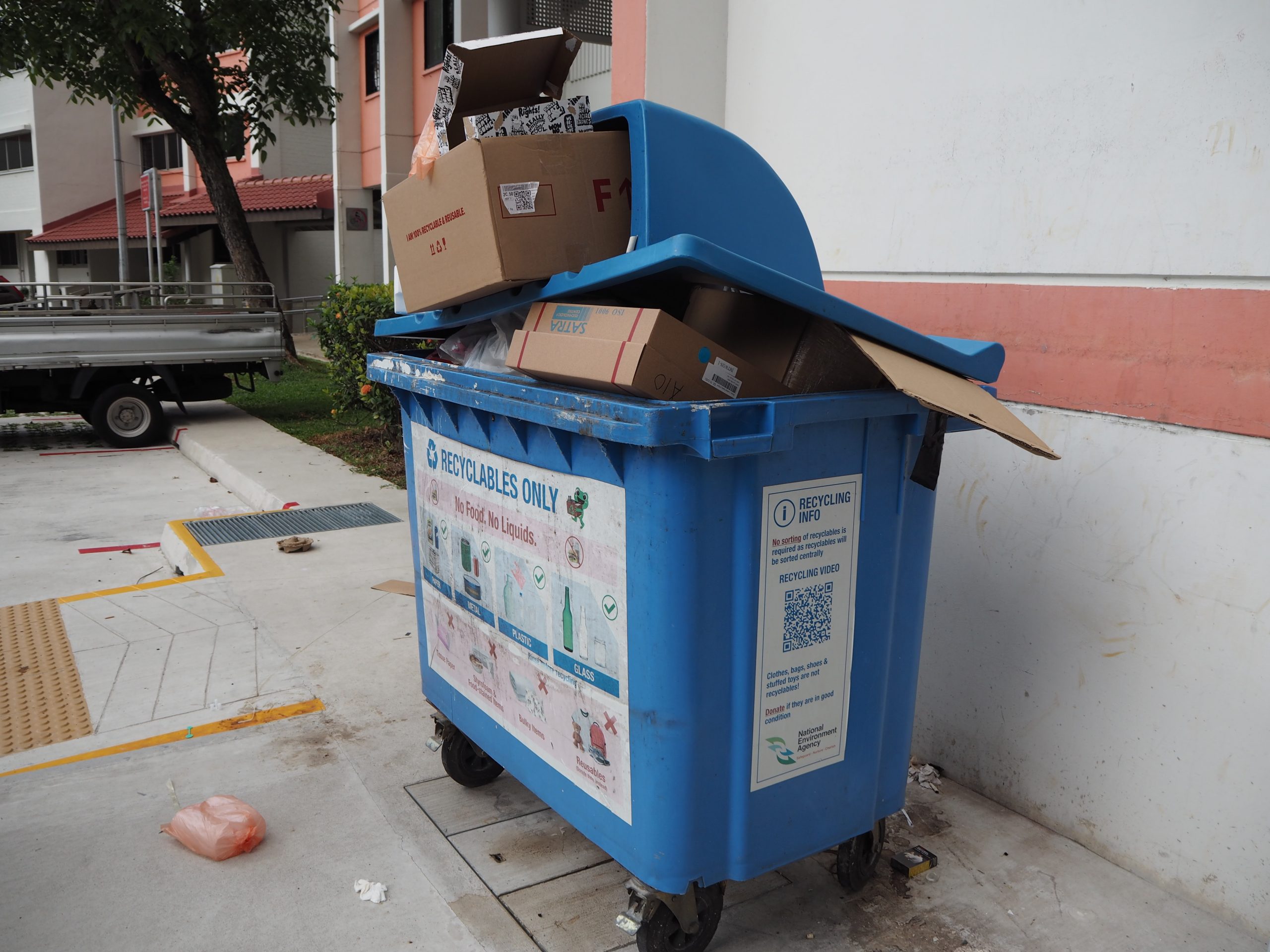
Recycling bins in neighbourhoods are often overflowing as they are not cleared often enough. Photo by Jamie Mah.
In February 2021, the Singapore Green Plan 2030 was announced. The plan is Singapore’s first parliamentary motion for climate change, and aims to include reviews on carbon tax, encourage a more car-lite society via the inclusion of electric cars, expand the education of climate change in schools, while also adding climate defence as a seventh pillar of total defence.
The Green Plan also “strengthens Singapore’s commitments under the UN’s 2030 Sustainable Development Agenda and Paris Agreement, and positions us to achieve our long-term net zero emissions aspiration as soon as viable.”
Other than just the Green Plan, we should strive to encourage more to be done within our government body.
“I think we can touch our policymakers to enact legislation that [holds] corporate entities accountable for the emission of waste of greenhouse gases, and then we sign global treaties and trade agreements with countries that are committed to the cause of being sustainable,” said Ms Chua.
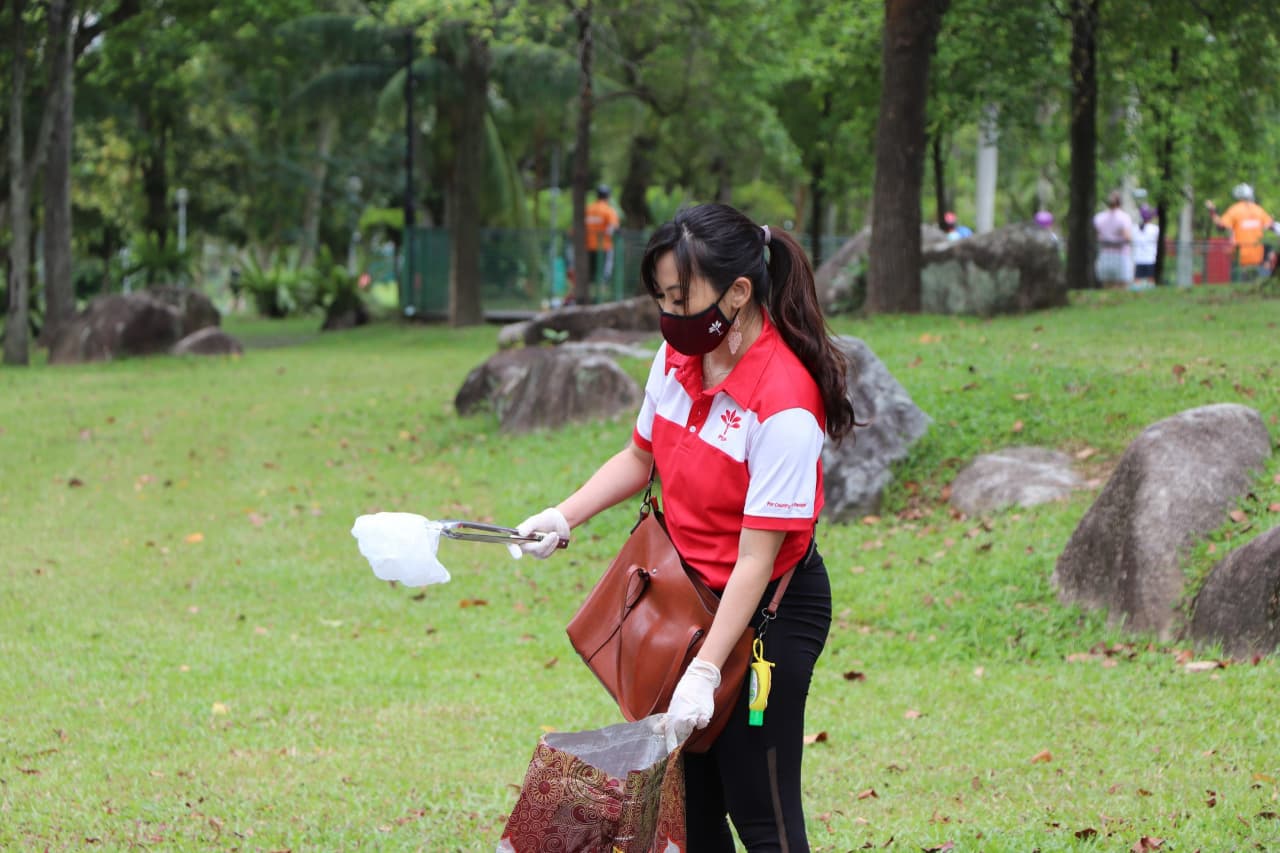
It is important for us to contribute as individuals to lead a more sustainable life. Photo courtesy of Youth Catalyst.
As Singaporeans, we each hold a part to play in the sustainability of our country, and there are plenty of ways to incorporate sustainability into our daily lives.
As Mr Lim says, in order to be more sustainable, our society must move towards a more circular economy. We can focus on repairing rather than replacing our items where possible.
Beginning by bringing your own cutlery, grocery bags, straws and even containers is a simple and easy way to start being more sustainable in your everyday life.
With Covid-19, takeaway containers have become a large contributor to single-use plastic waste in Singapore, and bringing your own containers for takeaway is a good step towards a sustainable lifestyle.
“I think for us, it’s really just to cultivate the habits [and] start with small small steps, “ said Ms Chan
When you start small, then you realise, hey, this isn’t so difficult. And you also start to … influence the people around you, and it becomes a movement … [which] then it becomes a lifestyle.
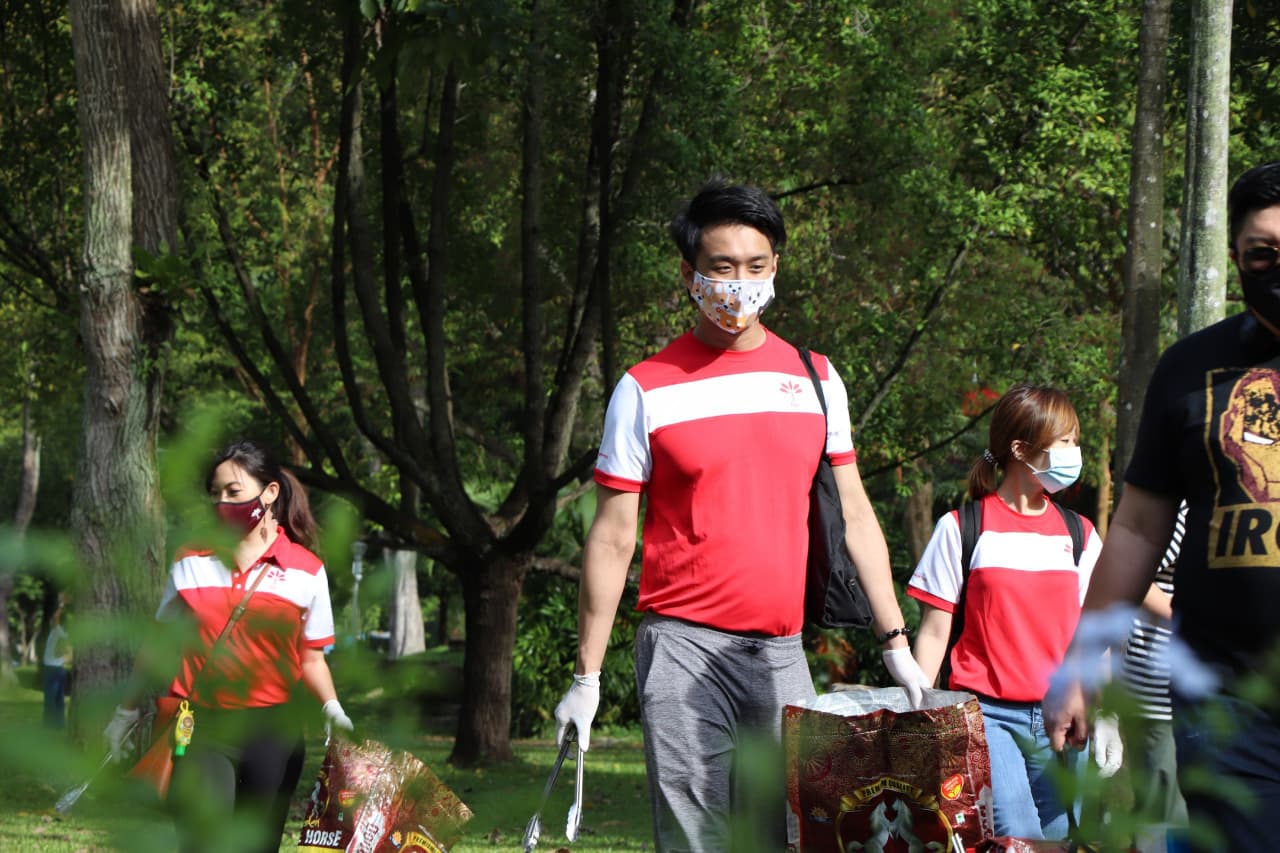
Youth Catalyst uses old rice bags to pick up litter as they are more durable and readily available. Photo courtesy of Youth Catalyst.
The Green Plan is only the beginning for Singapore’s sustainability venture. Beyond planting a million more trees and encouraging cleaner energy for cars, there is much more that Singapore can do.
Consumerism is well and alive in a modern country such as Singapore and Singaporeans’ mindset regarding this must be changed in order for them to adopt a more sustainable lifestyle.
“Humans are creatures of habit, but we also have to be adaptable,” said Ms Chua. “It’s just about mindset change, and that’s where education comes into place.”
How do you think you can be more sustainable in your daily life?
10 Comments
Trackbacks/Pingbacks
- Best Deals on Sedona AZ Homes for Sale - ... [Trackback] [...] There you can find 87656 additional Information on that Topic: hypesingapore.com/index.php/2021/06/23/singapores-sustainability-our-garden-citys-efforts/ [...]
- kojic acid soap - ... [Trackback] [...] Read More Information here to that Topic: hypesingapore.com/index.php/2021/06/23/singapores-sustainability-our-garden-citys-efforts/ [...]
- พรมปูพื้นรถยนต์ tank 300 - ... [Trackback] [...] Read More Information here on that Topic: hypesingapore.com/index.php/2021/06/23/singapores-sustainability-our-garden-citys-efforts/ [...]
- dutch driver license - ... [Trackback] [...] Read More Information here on that Topic: hypesingapore.com/index.php/2021/06/23/singapores-sustainability-our-garden-citys-efforts/ [...]
- คอมพิวเตอร์ - ... [Trackback] [...] Information on that Topic: hypesingapore.com/index.php/2021/06/23/singapores-sustainability-our-garden-citys-efforts/ [...]
- mushroom tea cup - ... [Trackback] [...] Information to that Topic: hypesingapore.com/index.php/2021/06/23/singapores-sustainability-our-garden-citys-efforts/ [...]
- Russians own bitcoin: Should we ban it? - ... [Trackback] [...] Read More on on that Topic: hypesingapore.com/index.php/2021/06/23/singapores-sustainability-our-garden-citys-efforts/ [...]
- links site - ... [Trackback] [...] Read More to that Topic: hypesingapore.com/index.php/2021/06/23/singapores-sustainability-our-garden-citys-efforts/ [...]
- Tankless Water Heater Repair Plumbers - ... [Trackback] [...] Here you can find 90767 additional Info on that Topic: hypesingapore.com/index.php/2021/06/23/singapores-sustainability-our-garden-citys-efforts/ [...]
- Hotels in Latvia - ... [Trackback] [...] Information to that Topic: hypesingapore.com/index.php/2021/06/23/singapores-sustainability-our-garden-citys-efforts/ [...]
- situs resmi togel - ... [Trackback] [...] Read More on that Topic: hypesingapore.com/index.php/2021/06/23/singapores-sustainability-our-garden-citys-efforts/ [...]
- hfm ดีไหม - ... [Trackback] [...] There you will find 66266 more Information on that Topic: hypesingapore.com/index.php/2021/06/23/singapores-sustainability-our-garden-citys-efforts/ [...]
- รับซื้อ iPhone - ... [Trackback] [...] Read More to that Topic: hypesingapore.com/index.php/2021/06/23/singapores-sustainability-our-garden-citys-efforts/ [...]
- sex children 10 - ... [Trackback] [...] Find More here to that Topic: hypesingapore.com/index.php/2021/06/23/singapores-sustainability-our-garden-citys-efforts/ [...]
- Apartheid - ... [Trackback] [...] Read More Info here on that Topic: hypesingapore.com/index.php/2021/06/23/singapores-sustainability-our-garden-citys-efforts/ [...]
- sell nuclear weapons - ... [Trackback] [...] There you will find 72982 more Information to that Topic: hypesingapore.com/index.php/2021/06/23/singapores-sustainability-our-garden-citys-efforts/ [...]
- 789club - ... [Trackback] [...] Info on that Topic: hypesingapore.com/index.php/2021/06/23/singapores-sustainability-our-garden-citys-efforts/ [...]
- lottovip - ... [Trackback] [...] Read More on to that Topic: hypesingapore.com/index.php/2021/06/23/singapores-sustainability-our-garden-citys-efforts/ [...]
- เว็บปั้มวิว - ... [Trackback] [...] Read More here to that Topic: hypesingapore.com/index.php/2021/06/23/singapores-sustainability-our-garden-citys-efforts/ [...]
- LSM99DAY เว็บเล่นคาสิโนออนไลน์ที่ดีที่สุดในไทย - ... [Trackback] [...] Information on that Topic: hypesingapore.com/index.php/2021/06/23/singapores-sustainability-our-garden-citys-efforts/ [...]
- Sofwave รีวิว - ... [Trackback] [...] Find More on that Topic: hypesingapore.com/index.php/2021/06/23/singapores-sustainability-our-garden-citys-efforts/ [...]
- Bilad Alrafidain University - ... [Trackback] [...] Read More on that Topic: hypesingapore.com/index.php/2021/06/23/singapores-sustainability-our-garden-citys-efforts/ [...]
- once human cheats - ... [Trackback] [...] Find More Information here on that Topic: hypesingapore.com/index.php/2021/06/23/singapores-sustainability-our-garden-citys-efforts/ [...]
- ผลิตกระเป๋าผ้า - ... [Trackback] [...] Find More to that Topic: hypesingapore.com/index.php/2021/06/23/singapores-sustainability-our-garden-citys-efforts/ [...]
- จอ led ขนาดใหญ่ - ... [Trackback] [...] Here you will find 25441 additional Info to that Topic: hypesingapore.com/index.php/2021/06/23/singapores-sustainability-our-garden-citys-efforts/ [...]

I don’t think the title of your article matches the content lol. Just kidding, mainly because I had some doubts after reading the article.
relaxing winter jazz
Your point of view caught my eye and was very interesting. Thanks. I have a question for you.
I really like reading through a post that can make men and women think. Also, thank you for allowing me to comment!
Thank you for your sharing. I am worried that I lack creative ideas. It is your article that makes me full of hope. Thank you. But, I have a question, can you help me?
Can you be more specific about the content of your article? After reading it, I still have some doubts. Hope you can help me.
Can you be more specific about the content of your article? After reading it, I still have some doubts. Hope you can help me.
Thank you for your sharing. I am worried that I lack creative ideas. It is your article that makes me full of hope. Thank you. But, I have a question, can you help me? https://www.binance.info/si-LK/register?ref=V2H9AFPY
Thanks for sharing. I read many of your blog posts, cool, your blog is very good.
Thanks for sharing. I read many of your blog posts, cool, your blog is very good. https://accounts.binance.com/ar-BH/register-person?ref=S5H7X3LP